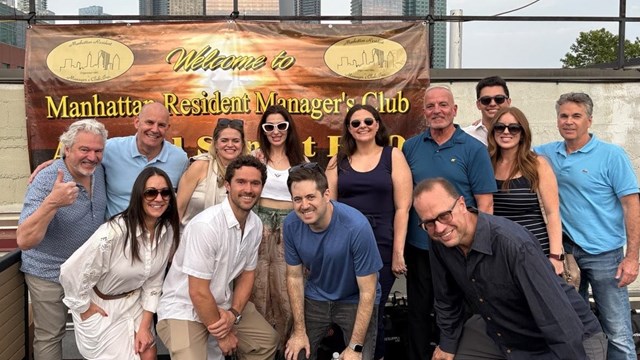
To Federation of New York Housing Cooperatives and Condominiums (FNYHC) executive director Gregory Carlson, there's a big difference between a co-op or condominium board and an informed co-op or condominium board. Carlson's unwritten job description is to eliminate examples of the former in New York.
To this end, Carlson, and the FNYHC go to great lengths, from organizing educational meetings for constituents to working with legislators on those constituents' behalf. "New York City is run by special interest groups," says Carlson. "What we do is help co-ops and condos get their voices heard in the appropriate places in the state, the city and on the national level. A lot of times when legislation is passed, those types of buildings are either left out, or are included where they shouldn't be in the overall rental landscape."
The mission of the Federation is providing education, advocacy and research to the co-op and condo community throughout New York City, Suffolk and Westchester areas, Carlson says. Owing back to its Section 213 roots, there are even members located as far away as Massachusetts and Michigan. The FNYHC regularly conducts seminars on timely issues of interest to their resident members, which are the co-op and condo boards. According to Carlson, the FNYHC has over 450 buildings on its member rolls, which is equivalent to roughly 200,000 units. "Although we represent buildings, our outreach is to board members," Carlson says.
A major project for the Federation is working with legislators on issues such as tax abatement and capital improvement allowances. Taxes, in particular, have been a focal point in recent years. In the early "˜90s, when real estate taxes were at peak levels, the FNYHC launched a grass roots campaign - an effort that involved everything from meeting with members of the city council to forming a political action committee - that contributed to tax relief in the form of the property tax abatement program, passed in 1996.
"In essence, what we've been saying is that co-op and condo shareholders are just like homeowners," Carlson says. "Yet before the bill was passed, the average condo dweller was paying five times as much in real-estate taxes as a homeowner." That program has been extended until 2004, but Carlson admits that the issue "is not finished." The tax abatement was technically a "temporary stop gap" measure, he says, and the Federation is seeking a replacement plan that would be more equitable for all homeowners.
"We're looking for a long-term equity plan in which we'd be a separate class from both homeowners (considered class 1) and rentals (class 2); something like a class "˜1-a'," Carlson explains. "It could be a decade before they eliminate the abatement and phase this in. We understand the city is in a budget crisis, so we're not out to hurt the city."
President and board member Albert Pennisi, a senior partner at the Manhattan law firm Pennisi, Daniels & Norelli, adds: "We'd like to make the law permanent as opposed to having to seek legislation every three years. We have to make sure that the law doesn't sunset."
Another incentive for the Federation these days involves the allowances provided by the city for capital improvements in buildings, like roof repair or installing a new generator. J-51 allowances were implemented several years ago to preserve the housing stock in New York City. Yet the program has not kept up with inflation, Carlson argues. "The maximum you'd get to replace a window, for example, might be $160, but you can't find one on the market for less than $250."
While property tax relief remains a top priority, other issues which the FNYHC is currently focusing on include "real time pricing" of electricity. In this way, cost savings can be achieved because people will be paying for only the amount of electricity that they are using. The peak period for using electricity is during the day, he says, but that is when most co-op and condo owners are typically not at home. There are new technologies which could significantly reduce electrical usage, Carlson says. "There are so many machines out there that would help cut down on electricity, such as micro turbine generators, or devices that shut off appliances automatically when they're not in use," Carlson says. "It would be in everyone's best interest to make them more affordable to buildings."
Officially formed in 1953, the FNYHC grew out of an organization known as the Presidents of Section 213, a title that refers to the highly successful Department of Housing and Urban Development (HUD) program that guaranteed underlying mortgages for buildings built in anticipation of returning World War II veterans. "That was really the beginning of the cooperative initiative in New York," Carlson says. "They were usually 40-year mortgages. The program was so good that the government started giving money back!"
In the 1980s, as an increasing number of rental buildings in the city converted to co-ops, the FNYHC did its part to ease the transition. "It's our job to explain to people what a co-op is, what their rights and responsibilities are as shareholders, what a board is," Carlson says. "We try to move them away from a rental mentality to an ownership mentality. In many buildings, the shareholders think that they're the tenants and that the board is the landlord. When that happens, there can be friction between the two."
Recently, the Federation has extended its services and outreach to condominium owners, even adding the word "condominiums" to its formal name. Members of the organization receive mailings about current issues affecting co-op and condo owners, as well as laws working their way through the legal system. Members can also access information on the group's Web site (www.FNYHC.coop) or (www.FNYHC.org).
The FNYHC also sponsors an annual trade show in which constituents gather for a day to attend workshops and seminars. Vendors are on hand to sell products and services, ranging from legal counsel to insurance coverage. Despite the presence of merchants, however, Pennisi is quick to point out that the trade show is geared "more toward education than toward the vendors. Our classes cover everything from "˜Board Membership 101' to how to choose a managing agent, to basic rudimentary things like understanding corporate documents and human rights."
2001 would have marked the Federation's 45th trade show, but it was canceled due to Sept. 11th. "After the tragedy, our members were involved in a lot of other things, so we thought it best to postpone it," Pennisi says.
In lieu of the big show, the Federation is going borough to borough, holding a series of "mini trade shows," or "town meetings," to address issues like mold, insurance and refinancing. The seminars are led by a panel of experts and members of the FNYHC board. The public may attend for a small charge.
On June 26, the Federation will hold a seminar on the state of the insurance industry. The seminar will take place at the LaGuardia Marriott, 102-05 Ditmars Boulevard, East Elmhurst, Queens from 7 to 9 p.m. The speakers will discuss the rising cost of insurance, environmental exclusions such as mold, lead paint, and oil spills, and recent legal decisions regarding insurance claims. In addition, they will address the difficulty in finding insurance carriers, which coverage and exclusions to look for in an insurance policy, and how to increase coverage and decrease premiums. The seminar is free for FNYHC members and $25 for non-members.
As executive director, Carlson reports to a board of six FNYHC directors who are elected annually by members. The FNYHC board relies on the expertise of its members in providing a resourceful nucleus of information in a variety of different fields. Pennisi puts his legal experience to work for the "Legal Corner" section of the FNYHC website. The Legal Corner provides assistance for members who have questions related to legislation, legal documents and insurance law, for example. "I can't give them legal advice, per se, but I can help them the best I can in terms of operating and managing a co-op," says Pennisi.
Board member David Buchwalter, a retired federal employee from the Department of Housing and Urban Development, is relied on for his experience in dealing with subsidized housing. Board member Mona Shyman works in real estate management, and Harvey Rubin, also on the board of directors, has been a board member "for decades," according to Pennisi. Other board members are Al Volpe, who is retired, and Dolores Guidel, a former teacher. "We try to choose people who will be of assistance to our members. It's a volunteer position and it's a lot of work, but the payback is that you're able to help people," Pennisi says.
Before serving in his executive post, Carlson was FNYHC president for three years, a job he inherited from Charlie Rappaport, who was something of a legend in the rarefied world of New York co-ops. "He was known as "˜Mr. Co-op'," Carlson says of his predecessor. "He knew everything." Humbly, Carlson adds: "I'll never fit Charlie's shoes, but I'm doing the best I can."
Recently, The Cooperator met with Carlson to discuss the issues facing the FNYHC in coming months.
"It had an enormous effect on insurance. Before Sept. 11, there was already an upward pressure on insurance rates. Since the tragedy, however, some buildings' insurance has doubled, and some insurers have pulled out of the game completely. The main problem is that re-insurers jacked up their rates and became tremendously selective about what they would cover. They decided they couldn't afford to take the 100 percent risk. Plus, there were buildings that were suspected of being highly targetable, and so the insurers wouldn't insure them. It will be hard to fight it. The main thing we can do is educate people and try to tell them ways to help minimize the effect. I think shareholders should shop around more for an insurance company. Usually people use a local broker, but I would advise them to go out further and see other brokers, too."
"The two prominent issues are mold and lead paint. Mold is being increasingly excluded in insurance coverage, and yet it is increasingly prevalent in all housing due to moisture. It has caused a lot of lawsuits, mainly from mold-related illnesses, like lung disease and asthma. Lead paint is another problem in buildings built before 1960. The same regulations that apply to window guards are now being implemented for lead paint. For co-ops and condos, it's the shareholder's responsibility to investigate lead paint, but we have to make them aware of that responsibility and see that if there's a problem, it's corrected."
"Of course, one of our most important is putting the long term real estate tax plan into effect. That has been our longest battle. Co-ops and condos are constantly lumped together with other types of multi-family housing. We are different from rentals. We have a different type of membership and a different type of ownership. The extension that Governor Pataki passed has given us some wiggle room, but to make sure that legislation is passed, we have to be on our toes. Also, with Mayor Bloomberg, we have a new administration, so we have to educate it as to what co-ops and condos are all about. We have to put some pressure on."





Leave a Comment